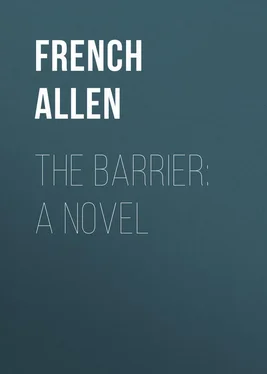Allen French - The Barrier - A Novel
Здесь есть возможность читать онлайн «Allen French - The Barrier - A Novel» — ознакомительный отрывок электронной книги совершенно бесплатно, а после прочтения отрывка купить полную версию. В некоторых случаях можно слушать аудио, скачать через торрент в формате fb2 и присутствует краткое содержание. Жанр: foreign_antique, foreign_prose, на английском языке. Описание произведения, (предисловие) а так же отзывы посетителей доступны на портале библиотеки ЛибКат.
- Название:The Barrier: A Novel
- Автор:
- Жанр:
- Год:неизвестен
- ISBN:нет данных
- Рейтинг книги:4 / 5. Голосов: 1
-
Избранное:Добавить в избранное
- Отзывы:
-
Ваша оценка:
- 80
- 1
- 2
- 3
- 4
- 5
The Barrier: A Novel: краткое содержание, описание и аннотация
Предлагаем к чтению аннотацию, описание, краткое содержание или предисловие (зависит от того, что написал сам автор книги «The Barrier: A Novel»). Если вы не нашли необходимую информацию о книге — напишите в комментариях, мы постараемся отыскать её.
The Barrier: A Novel — читать онлайн ознакомительный отрывок
Ниже представлен текст книги, разбитый по страницам. Система сохранения места последней прочитанной страницы, позволяет с удобством читать онлайн бесплатно книгу «The Barrier: A Novel», без необходимости каждый раз заново искать на чём Вы остановились. Поставьте закладку, и сможете в любой момент перейти на страницу, на которой закончили чтение.
Интервал:
Закладка:
"If you care to go up," she suggested, "the bedrooms might interest you."
But she looked out on the lawn through the open door, and longed to be there. The chattering groups called to every instinct of her nature; she wished to get rid of this encumbrance – to hand him over to any one and take her pleasure as she was used. And Ellis, too, looked out through the doorway.
"Up-stairs is more likely to be stupid," he said bluntly. "Let's go outdoors again."
In Mrs. Harmon's relief, she did not notice the characteristic which he displayed in this answer. Ellis was a fighter; power was all very well, but the winning of it was better. Just now he was like Alexander before India – looking upon a domain which must be his, and eager for the struggle. These people, and they alone, could put the capstone to the pyramid of his successes, and could lend glamour, if not give glory, to that wholly material structure. He would force them to it! Watching society disport itself, he regarded it as his natural prey. That assemblage was characterised by a suavity which deceived him; as he viewed the throng it seemed all mildness, all amiability. He did not appreciate the power of resistance of the apparently soft people.
And yet he had learned that money was not the effective weapon he had once supposed it. The arrogance of possession was against him, and though he did not understand the subtle reasons for his exclusion, he was sure that something besides a golden key was needed to open those doors.
It was not in Ellis to remake himself, nor did he try to change his ways. As when he faced the difficulty of buying the city government, he merely studied human weaknesses. The former experience had taught him that men are easier bribed without money than with, and that there are some passions, some ambitions, which do not include financial ease. Moreover, he had formed his plan; it was time to make the attempt.
"Miss Judith Blanchard – she is here?" he asked.
Mrs. Harmon looked at him in surprise. Did he wish to meet a girl? So far she had conducted the enterprise, and since their entrance on the grounds had tried to help him by introductions to the older people. But the experiment had failed, and he had no intention of repeating it.
"Why, she is here," she answered in doubt.
"Then introduce me to her," he directed brusquely.
Oh, if he wished! Mrs. Harmon was not pleased to be so ordered; she was not at all satisfied with her day. It was very troublesome, this trying to introduce Ellis. The manner of Mrs. Watson had been more distant than ever, while as for Mrs. William Fenno, her behaviour had been arctic. Mrs. Harmon cared for no further snubs, but if Ellis wished to run the risk of the meeting – well, Judith would fix him! Not pausing to watch the process, Mrs. Harmon presented Ellis to the young lady and escaped to her own enjoyments.
Ellis was where he had many times imagined himself, standing before Judith Blanchard, while the young men fell away on either side. He was meeting her glance, he was seeing for himself the "queenly form," the "regal head" ( vide the social columns of the Herald ), and he was experiencing at close hand the influence of her personality. It was magnetic even to him, for on hearing his name she turned quickly, looked him straight in the eye, and offered him her hand almost as a man would have done. When she spoke her voice had not the artificial tones of the women he had so far met; it had a genuine ring.
"So you are Mr. Ellis?"
"You know of me, then?" he asked.
"Every one has heard of you, even girls," she replied. Any one might have said this, but not with her look, not with that bright glance. She asked another question, which showed to those who listened her interest in the man. "You have settled the water-works affair?"
John Trask turned and strolled away; Will Mayne bowed to Miss Blanchard and silently betook himself elsewhere; Ripley Fenno mumbled a request to be excused, and left Miss Blanchard alone with her new acquaintance. Within five minutes, five times as many people were watching the pair curiously, but absorbed in a new interest, they did not notice.
"What do you know," he asked her, "about the water-works?"
But she pursued her own inquiries. "Or does the street-railway not take up your time? Or perhaps," she added boldly, "the court-house has no need of the services of its contractor."
Now the boldness of this last remark consisted in the reminder of a certain scandal, public-minded citizens (of whom the chief was Judge Harmon) claiming that there had been boodlery in the recent repairs of the court-house. It was more than hinted that Ellis had backed the contractors, and that he had shared the profits. His face changed, therefore, as she spoke, and she saw in his eyes a sudden gleam – of anger?
"Or," she asked quickly, "have I misread the papers, and you are not the contractor, after all?"
He was himself again, although looking – staring, almost – with deeper interest. At first he said no more than "I am not the contractor," but to himself he was crying: Success! He believed she had provoked him deliberately; he saw that she had studied his doings, for the court-house affair was almost a year old, the water-works deal occurred months ago, and the street-railway coup was of this very day.
"How much you know of matters!" he cried.
"I read the newspapers," she explained, "and with an object."
"An object?" he asked.
"I want to know what is going on," she explained. "I want to have to do with real things. I am interested in the doings of men , Mr. Ellis." And she made him a little bow, which he, still staring, made no attempt to answer. Then she turned, and walked toward a more open space where people could not, as they were beginning to do, press around them. "Will you not come and see the grounds?" she asked. In great satisfaction he kept at her side.
So this was Judith Blanchard! He had not believed it, had laughed at himself for hoping it, but she was what he had imagined her. Months of study had gone to make up his opinion of her; he had read of her, heard of her, watched her. Quick, impetuous, somewhat impatient of conventions – that was Judith.
"Do you know," she asked suddenly, "that we have met before? In a street-car, not a fortnight ago, we rode facing each other for quite a while. I remember meeting your eye."
He had recalled it many times. "I hope I didn't look too much at you," he said. "You must be used to having people watch you."
"Oh, please don't compliment," she interrupted, "or you will spoil my idea of you. I imagine you a man who thinks to the point, and speaks so, too. Yes, people do watch me wherever I go; they give me flattery, and think I love it. But if you and I are to be friends – "
"Friends!" he exclaimed involuntarily.
"Are you not willing?"
"Willing!" he repeated. "Miss Blanchard, you offer what I had not dared to hope one person here would think of in connection with me. I – " He looked at her searchingly. "You are not teasing me?"
"I used a strong word," she said.
"Then you did not mean it?"
"Why," she endeavoured to explain, "I spoke hastily. I have few friends."
"Few friends? You?"
"Yes, I," she answered. "Among the men, I mean. Those of my age are so" – and she smiled – "so young! I am not posing, Mr. Ellis."
Nor was she. Her interest in the great world was genuine, even if ill-balanced. Ruled by it, she looked into men and discovered, not how much there was in them, but how little they had for her. The good, the amiable, the well-intentioned, had none of them enough backbone to suit her; it was power that she wished to find. Always among respectable people, she was often impatient at their mediocrity; always among young people, she was tired by their immaturity. This day she had for the first time questioned if older people of another class had not more for her; she had been repeating the question at the moment when Ellis was presented. And now, without pose, she scrutinised him with frank question: Was he one who could bring an interest into her life and let her see the workings of the world?
Читать дальшеИнтервал:
Закладка:
Похожие книги на «The Barrier: A Novel»
Представляем Вашему вниманию похожие книги на «The Barrier: A Novel» списком для выбора. Мы отобрали схожую по названию и смыслу литературу в надежде предоставить читателям больше вариантов отыскать новые, интересные, ещё непрочитанные произведения.
Обсуждение, отзывы о книге «The Barrier: A Novel» и просто собственные мнения читателей. Оставьте ваши комментарии, напишите, что Вы думаете о произведении, его смысле или главных героях. Укажите что конкретно понравилось, а что нет, и почему Вы так считаете.












